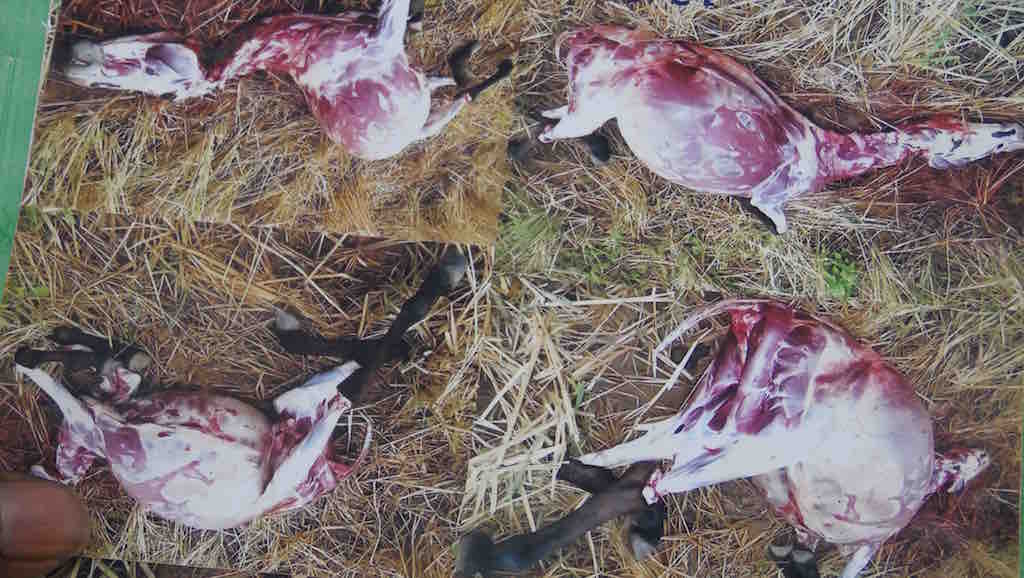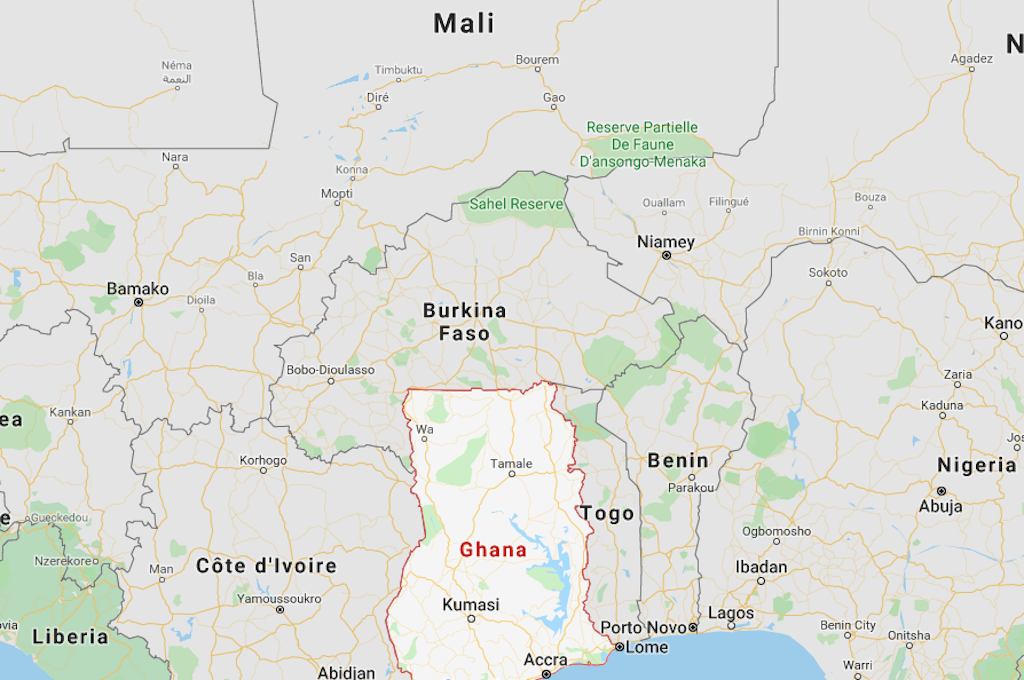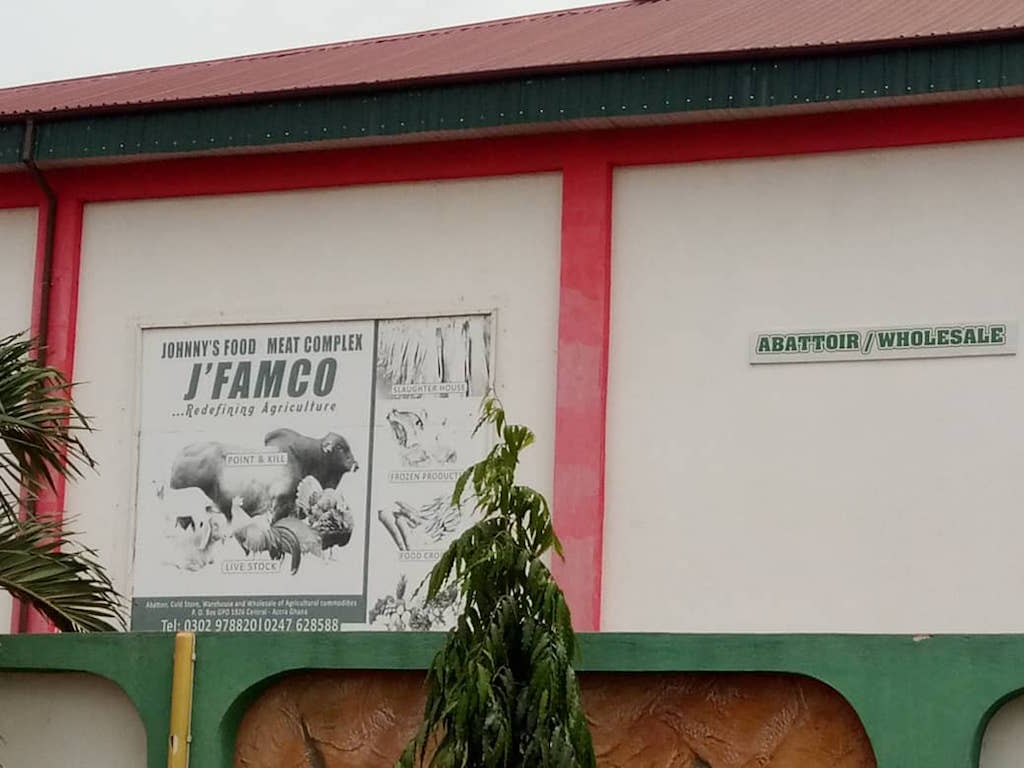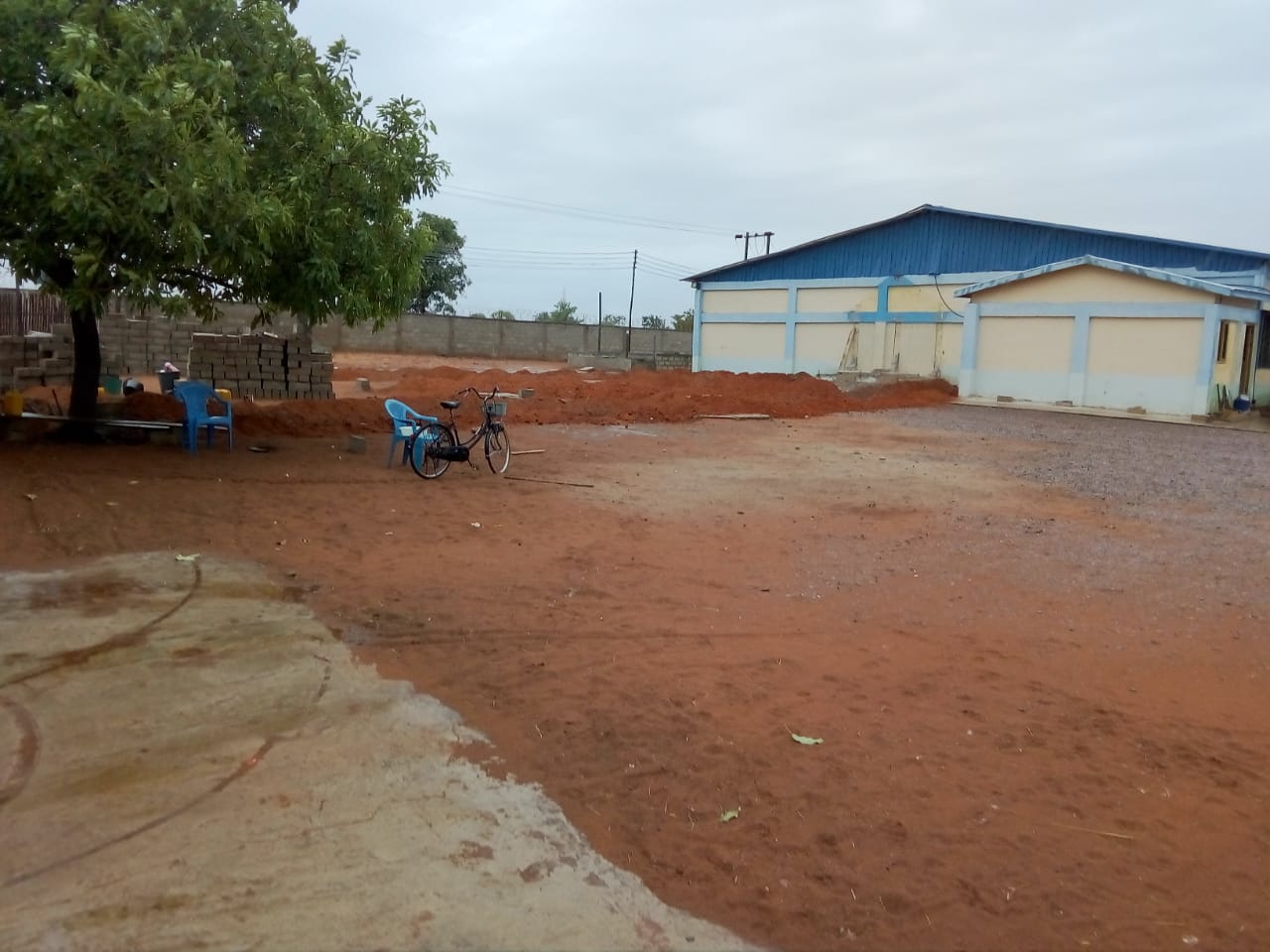
20 May The donkey slaughter capital of West Africa
Demand for donkey-hide glue has turned Ghana into the region’s slaughterhouse. Despite a clamp-down, the Chinese abattoir behind the trade is re-opening for business. Oscar Nkala investigates

These were my donkeys: One of the farmers described how his four donkeys were stolen and slaughtered in the bush so their skins could be sold to Blue Coast Abattoir. Photo courtesy Donyaepa
At face value, nothing distinguishes Walewale from other dusty little towns in northern Ghana. Located half-way between the provincial capitals of Tamale and Bolgatanga, Walewale is a collection of ancient mud-wall buildings with collapsing thatch-and-pole verandas.
The verandas often serve as roadside kitchens offering customers everything from woodsmoke-flavoured tea to supper, often beyond midnight. The narrow streets are permanently clogged with vehicular traffic and unruly bicyclists, motorcyclists and tri-cyclists who criss-cross the traffic lanes at will.
Along the roads, one quick observation is that cattle, goats and sheep are permanent residents and major players in Walewale’s traffic logjam. Casual passers-by may struggle to understand why the name Walewale strikes fear into the hearts of donkey owners in northern Ghana, and the southern regions of neighbouring Burkina Faso, Mali and Senegal.

Donkeys at a market in Bolgatanga, Upper East Region, northern Ghana. Photo: Oscar Nkala
The legend of Walewale
Sometime in late 2012, the Walewale District Assembly approved the opening of a donkey abattoir in the town. Blue Coast Trading, owned by Nicholas Liu, proposed a facility that would slaughter up to 70 donkeys a day for their meat and skins.
It would tap into the abundance of donkeys in the two northern-most regions of Ghana. To allay public fears that it would precipitate the local extinction of donkeys, Blue Coast Trading said it would slaughter only sick and old donkeys.
What the proposal did not state was that Walewale was attractive because of its proximity to larger donkey populations in three of Ghana’s northern neighbours, where the donkey skin trade was losing appeal amid rising public concerns about dwindling donkey populations.
Previous investigations by Oxpeckers Investigative Environmental Journalism have exposed how demand for ejiao, or donkey-hide glue, a Chinese medicine used to treat various old-age ailments, has turned the trade in donkey hides into a multibillion-rand business across the globe. Recent reports by animal welfare organisations estimate that the demand for hides coming from China could reach up to 10-million donkeys a year, representing almost a quarter of the entire global donkey population.
Because Walewale is located on a well-trodden contraband smuggling route that links north-eastern Nigeria, northern Ghana, central Burkina Faso, southern Mali and Senegal, it was easy to supply the abattoir with animals bought legally or even stolen from Ghana’s neighbouring countries.
Blue Coast Trading’s proposed abattoir was hailed by the Ghanaian government as a milestone achievement in its “One district, one factory” policy – aimed at creating jobs through the setting up of factories and industries that will move the country towards greater industrialisation.
It initially met resistance among local residents, however, and anger over the lack of consultation prior to its licensing. It only gained acceptance after local politicians, led by Walewale native and Ghanaian Vice-President Muhammadu Bawumia, convinced traditional chiefs that the project was a fulfilment of government policy, offered job dividends and a lucrative way to dispose of sick and old donkeys.

Walewale was attractive because of its proximity to larger donkey populations in three of Ghana’s northern neighbours, where the donkey skin trade was losing appeal amid rising public concerns about dwindling donkey populations. Courtesy Google Maps
Blue Coast Abattoir
After clearing the obstacles, Nicholas Liu opened Ghana’s first donkey slaughterhouse in April 2013. Complete with self-contained living quarters and a football pitch-sized pre-slaughter holding pen, Blue Coast Abattoir is a little fortress of high walls topped with razor wire and an electric fence.
It is the only truly modern structure in Walewale besides Bawumia’s home, set against the squalor about one kilometre away. Perhaps designed with trouble in mind, the only way into Blue Coast Abattoir is through a motorised security gate operated from a guardroom manned round the clock.
The precise date in April 2013 when the abattoir opened is unclear, but by September that year no one in Walewale wanted to be associated with a facility widely blamed for fuelling donkey thefts in the town and beyond.
In the town Oxpeckers met Salim bin Abdullah, a former line supervisor at the abattoir. He described a business that started off small, blossomed and expanded its acquisition policy from buying just the sick and old donkeys to include the strong and healthy.
“We opened with a workforce of around 30 men slaughtering between 20 and 40 donkeys a day,” he said. “More people heard we were buying donkeys, and within three months we were slaughtering around 70 animals per day. By December 2014, we were slaughtering between 150 and 170, and the workforce had grown to over 100.
“In mid-2015 the slaughter rates dropped because there were no more donkeys left around Walewale. Donkey traders and thieves stepped in with stock from Senegal, Mali and Burkina Faso and soon we were working in day and night shifts. We slaughtered more donkeys from its neighbours than from Ghana itself,” he said.
Initially the Blue Coast Abattoir exported donkey hides to China and threw away the meat. But by 2014 it was also exporting large quantities of meat to China and selling the bulk locally. Although most northern Ghanaians in the Northern and Upper East regions are Muslims and do not eat donkeys, many bought meat in bulk for re-sale in southern Ghana where donkey meat is a prized delicacy.
By early 2016 local resistance to the donkey skin trade had re-surfaced, fuelled by an alarming upsurge in donkey thefts all over northern Ghana. The abattoir turned into a battleground against stock theft as angry farmers looking for stolen animals often traced their skins to its cold rooms.
“The Chinese managers of the abattoir made enemies with the locals when stolen donkeys were found among awaiting-slaughter stock. Skins from bush slaughterhouses also turned up in the cold rooms,” Abdullah said.
“But the Chinese never stopped buying. They even paid incentives which encouraged more bush slaughters and fueled public resentment, even against locals who worked at the abattoir,” he said.

Johnny’s Food Meat Complex, a popular meat wholesaler in Accra, joined the donkey trade in 2015. Photo: Oscar Nkalo
Abuja resolution
Johnny’s Food Meat Complex (J’FAMCO), a popular meat wholesaler in the capital city Accra, took advantage of the donkey trade craze by adding the animals to its existing slaughter stock of cattle, goats and sheep in 2015.
According to Amasaba Aluizah of the Ghana Society for the Protection of Animals, J’FAMCO set up a donkey slaughter section but it was not licensed to begin slaughter operations.
By mid-2016 the donkey skin trade was firmly rooted in West Africa and Ghana had emerged as the regional slaughterhouse. Several bush operations were playing the role of secondary suppliers to licensed abattoirs like Blue Coast Trading.
In September 2016 the heads of veterinary services from all member states of the Economic Community of West African States (ECOWAS) met in the Nigerian capital, Abuja, to discuss ways of dealing with the donkey skin trade and its impacts on agriculture and community livelihoods.
Among other resolutions, the participating countries signed a Memorandum of Understanding which restricted the donkey skin trade. It specifically prohibited all veterinary officers in West Africa from issuing permits for donkey movement, slaughter and product export.
In January 2017 the Ghana Veterinary Services Directorate moved to enforce the Abuja resolution.
“The Veterinary Services has observed, with alarm, a sharp decrease in the number of donkeys on a daily basis, especially in the northern parts of the country. At this rate, the population of donkeys is likely to be depleted in two to three years,” stated the organisation’s director, Dr Kingsley Micky Aryee, in a notice issued on January 17 2017.
“The Veterinary Services has therefore decided to ban, with immediate effect, the indiscriminate slaughter of donkeys and the export of their skins. All regional veterinary heads must ensure that this directive is strictly complied with. Anybody caught defying it will be strictly dealt with.”
LISTEN: “The donkeys used to help a lot of people, especially my family”
Legal loopholes
Soon after the order of January 2017, Blue Coast Abattoir closed down and its Chinese operators left Walewale. However, animal welfare campaigners believe the donkey trade never stopped in Ghana.
Aluizah said the Ghana Society for the Protection of Animals is still fighting for the enactment of a law to criminalise the donkey trade.
“The slaughters have not stopped because the ban was based on an MoU. It is not a law, and is therefore not enforceable. The MoU only restricts, but does not ban the donkey skin trade. Veterinary officers do not have the power to arrest or prosecute offenders.
“While large-scale abattoirs have closed, bush slaughterhouses are still open. Many people in Ghana traditionally slaughter and eat donkeys. In the past they would eat the meat and throw away or burn the hides, but nowadays they sell to the Chinese,” he said.
In Ghana crimes concerning cruelty against or neglect of animals are prosecuted under the Criminal Code (of 1960). However, Aluizah said the law is long overdue for reform because it has no specific clauses to curtail or prevent the donkey hide trade.
“The Criminal Code must be reviewed. There must be clear protection mechanisms and sanctions for the donkey thefts and illegal slaughters we are witnessing.
“For now, veterinary officers can only seize the meat or hide, but they have to let donkey trade offenders go because there is no law to prosecute them. There must be a disincentive,” Aluizah said.
In Tamale Oxpeckers met Amadu Hudu, director of the Development and Environmental Protection Organisation (Donyaepa), who monitored and fought against Blue Coast Abattoir in Walewale until its closure in January 2017.
“The impact of the abattoir in Walewale was huge and negative across northern Ghana and its immediate neighbours. We continue to feel the effects, with people who previously owned and used donkeys to pull water carts, farm implements and carry goods now doing the job with their bare hands.
“Some try to share the few animals left, which means donkeys that survived have to carry the loads left by the slaughtered stock. More girls are dropping out of school to do jobs previously done by donkeys,” Hudu said.
According to figures from the Ministry of Food and Agriculture, Ghana had 11,797 donkeys in 2015. Hudu believes the almost four years of indiscriminate killing that took place at Blue Coast Abattoir reduced the number by more than half.
“The reason why the Chinese ended up importing donkeys from Burkina Faso, Mali and Senegal is that there were no more donkeys to buy inside Ghana. That points to a drastic reduction in numbers, and progress towards extinction of the species,” he said.

The expansion of Blue Coast Abattoir taking place in the foreground, with the original structure in the background. At its peak in 2016, the facility slaughtered well over 300 donkeys a day. Photo: Oscar Nkala
Meeting Nicholas Liu
All approaches to the Blue Coast Abattoir premises are covered by CCTV cameras, so it was no surprise when a security guard walked up to the gate even before Oxpeckers rang the bell.
After exchanging identities, the guard disappeared into the main complex. He emerged 15 minutes later to say the director had agreed to an impromptu meeting.
Inside the complex, new foundations have been dug for what appears to be an extension that will double the slaughter capacity of the factory. Even a good eye-scan of Liu’s office offers no hint of the size of an enterprise which, at its peak in 2016, slaughtered well over 300 donkeys a day.
A tall, soft-spoken man of slight built, Liu differs from many of his Chinese business peers in Africa because he speaks perfect English. In the presence of a Chinese man identified only as the factory manager, he told Oxpeckers he had returned to Ghana after a three-year absence.
Asked if his return to Ghana was related to business, Liu said: “Yes, we have sorted out the paperwork and renewed the abattoir permit. We were supposed to open in the last week of April, but we had delays because we are still building additional structures.
“As you can see, the foundations have been dug, the gravel and bricks have been delivered and the builders will be here tomorrow. We hope to open in the first or second week of May,” he said.
Due to the ongoing expansion of the holding pens, Liu said he had not started buying donkeys yet, but would do so soon. Four business certifications adorn the wall behind him, including one he pointed out as the renewed licence for the abattoir.
However, he refused a close examination of the documents on display. Asked how Blue Coast Trading renewed its donkey abattoir licence in Ghana despite the donkey hide trade and export ban of January 2017, he ducked the question.
Instead, he said the company would not do anything illegal “in the place of the vice-president”.
“This is the place of the Vice-President [Muhammadu Bawumia], you can’t do anything here without [a] permit. We operate with his permission and from the [District] Assembly. The veterinary people are with us too, so we are doing everything according to the law,” he said.
Liu said veterinary officers from the Walewale and Bolgatanga municipalities were helping with compliance checks towards the opening of Blue Coast Abattoir.
Efforts to get comment from the Walewale District Assembly, the minister of agriculture and Bawumia on these statements by Nicholas Liu were not successful.
Veterinary Services said no abattoir licence had been issued to Blue Coast Trading. Director Aryee said the trade ban of January 2017 had not been cancelled nor amended. He professed ignorance of the planned re-opening of the Blue Coast Abattoir in Walewale, but did not rule out the possibility.
“We have no power to stop abattoirs from opening because in Ghana district assemblies decide whether or not to license businesses. In this case, you need to go back to find out from the head of the Walewale District Assembly,” he said.
Donyaepa’s Amadu Hudu said the world should not stand by and allow the re-opening of the abattoir in Walewale as West Africa is yet to recover from its disastrous operations between 2013 and 2016.
“If confirmed, re-opening the abattoir will prove there is no law in Ghana,” Hudu said. “The donkey trade ban of 2017 is still in force. So how can Blue Coast Trading renew a donkey abattoir licence?
“We will ensure that Walewale does not become the donkey slaughter capital of West Africa again,” he said.
Expenses for this investigation by Oxpeckers Investigative Environmental Journalism were supported by The Donkey Sanctuary
